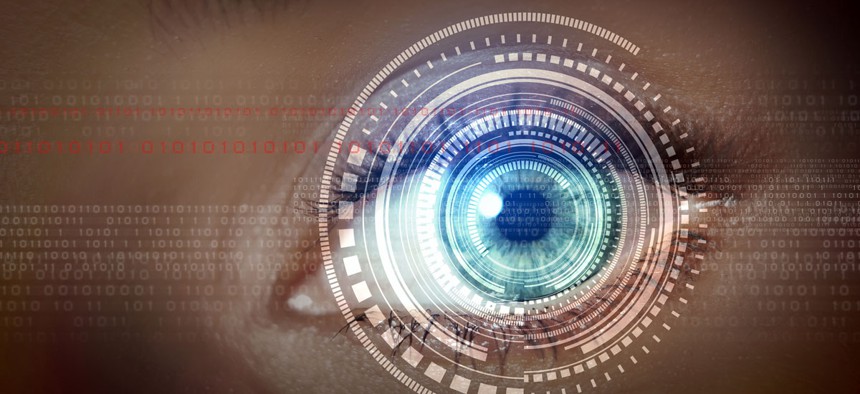Long-Range Iris Scanning Is Here

Sergey Nivens/Shutterstock.com
An engineering professor at Carnegie Mellon says he’s invented technology that can identify someone from across the room with the precision of a fingerprint.
An officer pulls someone over on the side of the highway. The cop sits in the car a moment, runs the plates—they’re fine—and gets out of the car. As he or she approach the driver’s side window, the driver pulls out a gun, shoots the officer, and flees.
This is something close to what happened in Long Island earlier this year, when a Suffolk County police officer was shot during a traffic stop. Unlike the recent traffic-stop shooting in Hattiesburg, Mississippi, the suspect in the New York case, police told CBS, was a “known gang member.”
Marios Savvides, a Carnegie Mellon engineering professor, says he’s invented the fix: a long-range iris scanner that can identify someone as they glance at their rear-view mirror. In other words, it’s technology that could potentially identify a dangerous suspect before the cop even gets out of the car.
It is the first effective long-range iris scanner, he says.
In this video from March, he demonstrates how his technology would work:
As with fingerprints, an individual’s iris is so distinctive as to be unique.
“Fingerprints, they require you to touch something. Iris, we can capture it at a distance, so we’re making the whole user experience much less intrusive, much more comfortable,” Savvides told me. Unlike other scanners, which required someone to step up to a machine, his scanner can capture someone’s iris and face as they walk by.
“There’s no X-marks-the-spot. There’s no place you have to stand. Anywhere between six and 12 meters, it will find you, it will zoom in and capture both irises and full face,” he said.
Carnegie Mellon describes a whole host of functions for the scanner beyond just police use. It could replace government IDs at the airport and elsewhere. Like other types of biometrics, it could replace a laptop’s login system.
As a sector, biometrics are undoubtedly important. Many security experts believe that passwords—and the security regime that accompanies them—are fundamentally broken. Savvides, for his part, sees biometrics as one more method of human-computer interaction. And near everyone would like to reduce traffic-stop murders.
Yet there’s something threatening about long-range iris scanning. Identification to a degree comparable to finger prints, at a distance, is not something our social habits and political institutions are wired for. Check this image, which a Carnegie Mellon spokesman sent to me and encouraged me to use:

Okay, this is hella creepy! Imagine this with the genders reversed: an adult man checking out some ex-girlfriend’s new boyfriend. This cartoon, too, is just weird:

I don’t mean to ridicule these images: It’s just not hard at all to imagine sinister applications of this technology. If Savvides’s invention works as well as he says it does, governments could scan the face of everyone walking on a city block. It could algorithmically identify a disguised political activist walking down a city street, driving a car, or passing through airport security.
When I asked Savvides about the security and privacy implications of his long-range scanner, he said there were other threats he considered much more serious. “I always hear the same thing, ‘Oh, well now I can be tracked with biometrics,’” he told me. “There’s no need to do that—it’s too expensive.”
“People are being tracked, their every move, their purchasing, their habits, where they are every day, through credit card transactions, through advantage cards—if someone really wanted to know what you were doing every moment of the day, they don’t need facial recognition or iris recognition to do that. That’s already out there,” he said.
It’s a little strange to cite the threat of corporate surveillance when talking about iris scanning, because the concept’s most famous appearance in science fiction is … corporate surveillance. In the film Minority Report, advertisers use iris scanners to serve personalized billboards to people as they walk by, which call out to them by name: “John Anderton! You could use a Guinness right about now.”
I proposed a different hypothetical to Savvides: What if a political activist, trying to flee a repressive regime, was identified by his or her irises and apprehended?
“You used that example, and I actually want to use that example because I had that discussion just now with a non-profit,” Savvides replied.
“One of the biggest world problem is human and sex trafficking: kids being abducted and trafficked across borders. And if there was such a system at the borders that could identify them, you don’t know how much their own governments want that, because they cannot control how many poor children are being abducted and sold to other countries,” he said.
“That is more often than once a decade, there is some prisoner who may be high-profile. This happens every day, every second, in some country. I would go to sleep at night very peacefully knowing that I saved a 5-year-old child that had been transported across the country.”
Seraphim Global, a Virginia-based non-profit which works to stop trafficking, confirmed they are working with Savvides.
Iris scanning is already in use around the world. In the United States, police have scanned the irises of prisoners in custody for at least four years. “We have everybody in orange jumpsuits, so everyone looks the same. So, quite literally, the last thing we do before you leave our facility is we compare your iris to our database,” a spokesman for the Plymouth County jail in Massachusetts told Reuters in 2011.
Around the same time, the Indian government began scanning the iris of every citizen in order to assign them a Unique Identification Number, which they must have to receive certain government benefits. The United Arab Emirates has scanned the iris of everyone entering or leaving the country for more than a decade.
These existing technologies, though, only worked at close range. In fact, iris scanning has been defended in the U.S. so far because it seemed impossible to use it discreetly. You’d know if your irises were getting scanned.
“It requires a level of cooperation that makes it very overt—a person knows that you're taking a picture for this purpose,” the CEO of an iris-scanning technology said in the same 2011 Reuters story.
If it succeeds, long-distance scanning will change all that. Savvides says his team has secured a patent for his invention and will continue to work to make it easier and cheaper. He continues, too, to look for positive implementations of it.
“Hollywood has done such an amazing job of stigmatizing iris [scanning] negatively,” he told me. “I develop technology, and the goal is, how can this help society? How can I save a life?”
(Image via Sergey Nivens/ Shutterstock.com)






